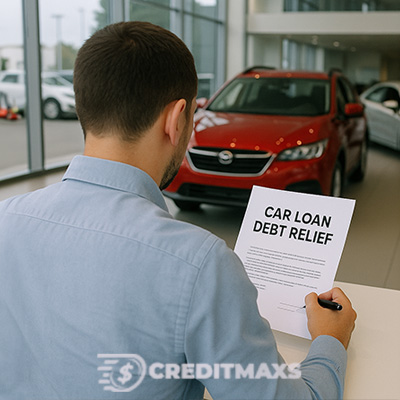Car Loan Debt Relief Programs Cut Costs & Avoid Repossession!
Struggling with high car payments? You’re not alone. Many drivers are seeking Car Loan Debt Relief to regain control of their finances and avoid the risk of losing their vehicle.
The good news is that several relief programs can help you lower payments, stop repossession, and rebuild your financial stability.
This post walks you through the best options available and how to take action today.
Proven Debt Relief Programs to Lower Your Car Payments 🚘

Loan Refinancing vs. Loan Modification – What’s Best for You? 🔄
When searching for effective Car Loan Debt Relief, two of the most accessible options are refinancing and loan modification. While they serve a similar purpose—reducing your monthly burden—they work differently.
- Refinancing involves replacing your current loan with a new one that typically has a lower interest rate or extended term. This can instantly reduce your monthly payment if you qualify.
- Loan modification, on the other hand, is a direct adjustment of your current loan terms by your lender. This could involve deferring payments, reducing your rate, or extending the payment schedule without replacing the loan.
Choose refinancing if your credit score has improved. Opt for modification if you’re facing hardship and can’t qualify for new credit.
Government and Private Programs That Help Reduce Auto Debt 🏛️
There are both federal assistance options and private lender programs available for those in need of Car Loan Debt Relief:
- State-sponsored financial counseling programs can help you negotiate with lenders.
- Some credit unions and nonprofit financial organizations offer hardship assistance and lower-interest refinancing.
- OEM lenders (like GM Financial, Ford Credit) may have their own forbearance programs during economic downturns.
These programs can help you avoid defaulting on your loan and guide you toward more sustainable payments.
How to Stop Repossession and Keep Your Car 🚨
What to Do If You’re Behind on Payments 📉
If you’ve missed payments or anticipate falling behind, take action before your vehicle is at risk of repossession. Here’s what you should do:
- Contact your lender immediately and explain your financial situation.
- Ask if they offer hardship forbearance or payment deferral options.
- Explore Car Loan Debt Relief programs through local credit unions or financial counseling services.
Acting early shows lenders you’re proactive, increasing the chance they’ll work with you instead of pursuing repossession.
Negotiating a Payment Plan That Works for Your Budget 💬
Lenders are often more flexible than people expect—especially if they see you’re making a sincere effort. Here’s how to approach them:
- Present a detailed monthly budget showing your income and expenses.
- Propose a realistic payment plan you can stick to.
- Be honest about what you can afford, and emphasize your desire to avoid default.
Negotiated solutions can include payment restructuring, interest-only payments for a period, or temporary reductions.
Long-Term Strategies to Stay Financially Secure 💼
Smart Budgeting Tips to Prevent Future Auto Loan Struggles 📊
Avoid falling into the same trap again by improving your financial habits. Budgeting is one of the most powerful tools for long-term relief. Here’s how:
- Track every expense and categorize your spending.
- Use the 50/30/20 rule: 50% needs, 30% wants, 20% savings/debt repayment.
- Build an emergency fund to cushion against job loss or unexpected bills.
Maintaining a healthy budget ensures that you can meet loan obligations without risking financial collapse.
How to Rebuild Your Credit Score After Loan Hardships 📈
Your credit score may take a hit during financial difficulty, but it’s possible to rebuild with the right steps:
- Pay all remaining debts on time, even the minimum amounts.
- Consider a secured credit card or small personal loan to establish positive payment history.
- Check your credit report regularly for errors and dispute them if needed.
By restoring your credit, you’ll not only qualify for better loan terms in the future but also improve your overall financial health.
Take Charge of Your Finances with Car Loan Debt Relief 🛠️
Getting behind on car payments is stressful—but you’re not without options. Through Car Loan Debt Relief programs, refinancing, payment modifications, and smart financial planning, you can regain control, lower your monthly burden, and avoid losing your vehicle.
Don’t wait until repossession is looming—act now and take the first step toward financial freedom.
FAQ: Car Loan Debt Relief 🧠
1. What is the best debt relief option if I’m unemployed?
- Start by contacting your lender to request forbearance. You may also qualify for government hardship programs or non-profit financial counseling.
2. Will applying for debt relief hurt my credit?
- Not necessarily. Loan modification doesn’t typically lower your score, but missed payments prior to relief can have an impact. Refinancing may cause a small dip due to a credit inquiry.
3. Can I refinance if I have bad credit?
- Yes, but you may receive higher interest rates. However, credit unions or lenders that specialize in bad credit may still offer better terms than your current loan.